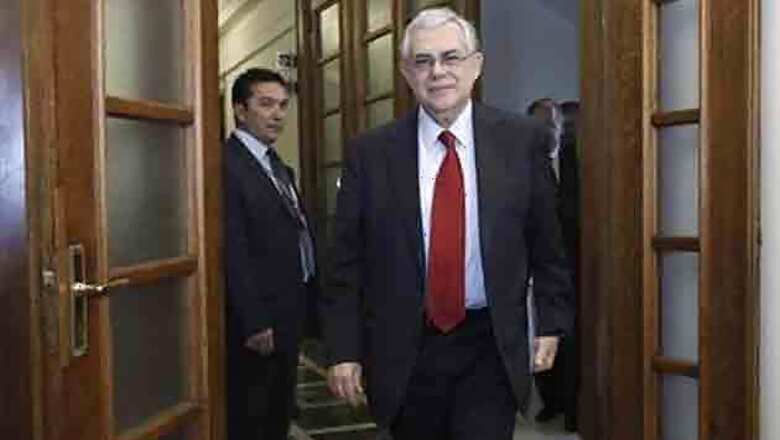
views
Athens: Three weeks before Greece has another election, opinion polls published on Sunday indicated the election will result in no single party gaining a majority in parliament, but two parties that favor implementing Greece's bailout programs could be able to form a coalition government.
The four surveys show that Greek voters, tired of more than two years of austerity that have seen salaries and pensions cut and new taxes imposed, nonetheless want Greece to keep the euro and not revert to its own currency, the drachma.
The polls were published Sunday in the To Vima, Real News, Proto Thema and Eleftheros Typos newspapers.
The polls indicate that pro-bailout New Democracy party and anti-bailout Syriza would probably finish first and second again, but that New Democracy would win more seats in parliament than during the May 6 national election, allowing it to team up with Socialist PASOK in a governing coalition.
Voters angry at austerity measures had given both the conservatives and socialists a drubbing on May 6, dropping them to historical lows. The socialists, winners of the previous election in 2009 dropped from 43.9 per cent to 13.2 per cent of the vote and third place, while the conservatives won but saw their vote drop from 33.5 per cent to 18.9 per cent. Syriza, the main beneficiary of the protest vote, jumped from fifth place and 4.6 per cent in 2009 to second and 16.7 per cent.
The polls show New Democracy ahead of Syriza from 0.5 to 5.7 per cent, reversing a trend in recent opinion polls in which Syriza was seen as the front-runner. Both New Democracy and Syriza are expected to poll well above 20 percent while the third-place socialists are halting their slide and smaller parties are squeezed. The polls also estimate that New Democracy and the socialists will have a combined 159 to 165 seats in the 300-member parliament, up from 149 in the outgoing one, allowing them to form a pro-bailout, pro-austerity government. They could conceivably be joined by the Democratic Left, which is projected to elect from 13 to 16 deputies, down from 19. All three parties want a partial renegotiation of the bailout deal to boost economic growth, while Syriza has called for immediate repudiation.
In the tracking poll published in To Vima, more than 65 percent of respondents said they will vote to keep Greece in the euro, while only 25 percent said they would vote to get out of the bailout agreement. The same number (65 percent) replied that Greece must remain in the Eurozone even if it has to implement the bailout agreement as it stands, while 24 percent said they would prefer to exit the euro rather than implement austerity policies.
Debt-mired Greece has been kept solvent since May 2010 through generous loans from its European Union partners and the International Monetary Fund. A first bailout package of (EURO)110 billion ($138 billion) was agreed in May 2010 and a second, (EURO)130 billion ($163 billion) deal was approved in March 2012. A separate deal with private creditors earlier this year allowed Greece to write nearly (EURO)107 billion ($134 billion) off the country's (EURO)368 billion ($463 billion) debt as holders of Greek bonds took a hit.
Three of the polls questioned about 1,000 people and the Eleftheros Typos 1,212. That would give the polls a margin of error of about plus or minus 3 percentage points.




















Comments
0 comment